Valium 10Mg Buy Online India On our recent trip to Vermont, Matt and I were fortunate enough to be there during sugaring season. For West Coast city dwellers like me (or anyone not living in the Northeast or Canada), who may not know what that is, it’s the short span of time where maple trees flow with sap and maple syrup is made.
https://www.pslra.org/6rvjpal0c1 While I still don’t take it for granted, Vermont maple syrup is a staple in our life. We put it in baked beans, use it as glaze for meat and roasted veggies and let’s not forget the waffles. Whether it’s brought to us, or we bring it home from a visit, a quart of Vermont maple syrup makes it into our fridge at least twice a year. We’ve developed a taste for the good stuff, so it has to be Vermont maple syrup now. When we run out and have to buy it from Trader Joe’s (at $14.99 a quart), we realize how spoiled we are.
https://www.iql-nog.com/2025/01/19/2ku62y9 At first, our syrup always came from Matt’s step-dad’s buddy Bernie. We’d never met him, we just knew that the delectable maple syrup we enjoyed so much came from his sugarhouse. Then a couple of years ago, Matt’s mom and step-dad tapped some of their own trees during sugaring season and made a small batch of their own. The next year, they tapped a few more and made some to send us. It was of course delicious and I was impressed. It’s not something we can do here in the Pacific Northwest, as we don’t have the necessary weather or trees.
follow site Matt and I had been talking about trying to time a visit to Vermont during sugaring season and since we are getting married there this Fall, we needed to go out there to work on some of the wedding details anyway. Since sugaring depends on the weather (warm days and cold nights) and we were going towards the end of March, there was no guarantee that we would be there at the right time. Boy, did we get lucky! In just four days, we were able to tap some trees, gather sap and do a boil from start to finish. We got to tour a couple of sugarhouses as well (one of them Bernie’s), to see how it is done on a larger scale.
Tramadol Sales Cheap This is a picture heavy post, and it kind of has to be to convey the whole experience, so I am going to let the pictures do most of the talking here.
https://osteopatiaamparoandres.com/9m89c8m
get link go site DAY 1- Tapping Trees
https://tvnordestevip.com/g5ddjdqqyw Taps installed- 30
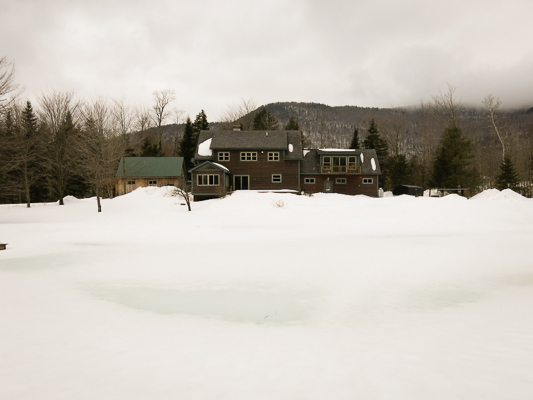
source url John set out ahead of us on his ATV and placed the buckets at the base of the maple trees we were to tap.
go here One of us would drill the hole, the other would hammer in the tap and the third would place the bucket.
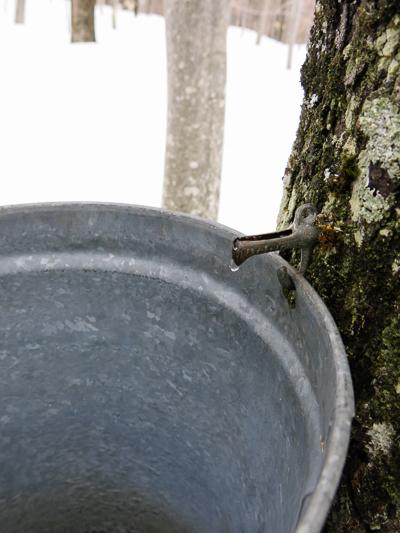
follow https://opponix.com/f0pjmhh1 DAY 2- Sugarhouse Tours
go site There were so many things about sugaring that appealed to me and piqued my interest; the history, tradition, community, equipment and, of course, the finished product. I have no illusions about what hard work it really is though. Both of the sugarhouses we visited, stated that 80% of their time is spent in the woods (not in the sugarhouse), installing taps and then walking the lines to check for damage from deer or squirrels. Sounds fun on a nice sunny day, but maybe not so enjoyable on cold, rainy/snowy ones. I realize that I got to see the romantic part, the boiling, which is what they do in the evenings mostly, when all their other tasks are done.
Valium Pills Online https://valkyrieswebzine.com/nouvel/buy-roche-diazepam-online.php First Stop- Donnie’s
- Taps- 3,000
- Make about 21 barrels a year (a barrel is 45 gallons).
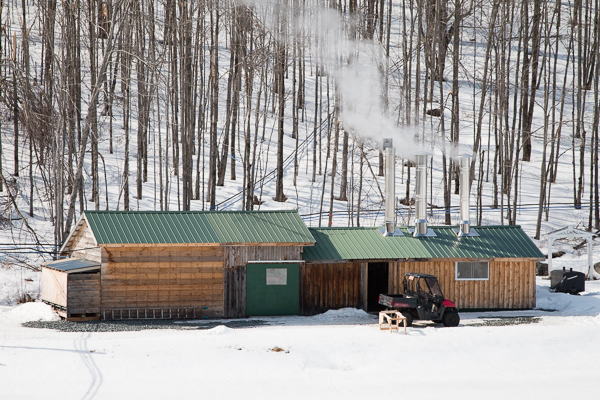
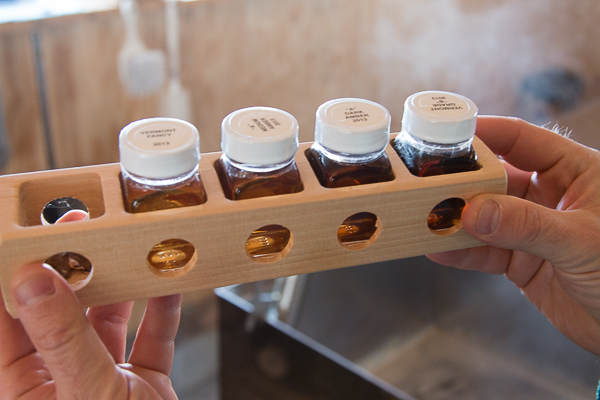
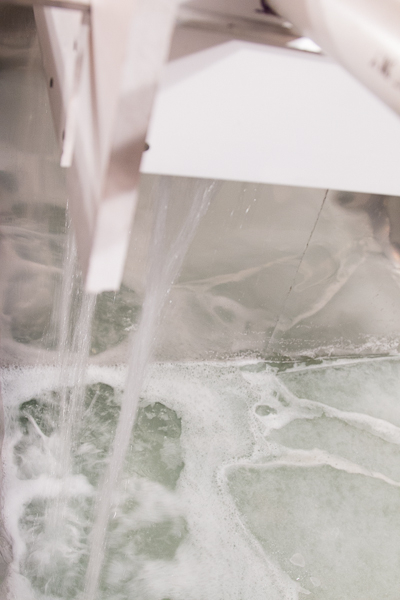
source https://thelowegroupltd.com/4r0kn5f37 Second Stop– Bernie’s
- Taps- 6,000
- Makes about 50 barrels a year.
- On a good night can make about 3 barrels in 4 hours.
- Wood-fired



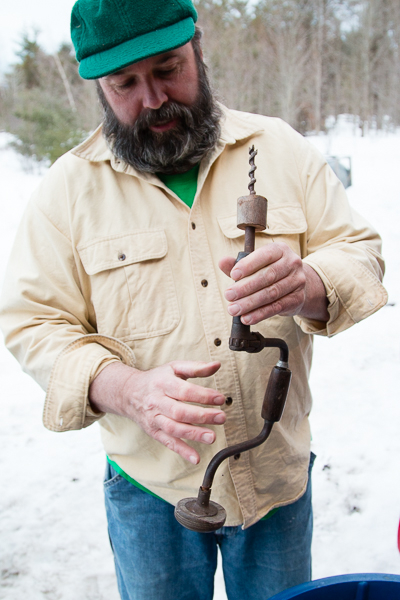
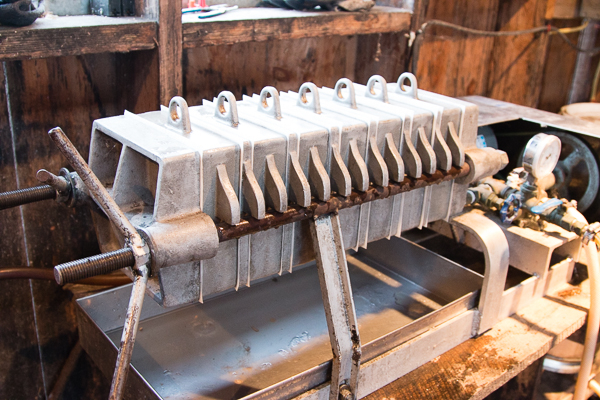
https://www.pslra.org/upxvq898 We got to Bernie’s just as he was starting to boil and we were able to watch the entire process. John has helped him do boils before, so he jumped right into cleaning filters.
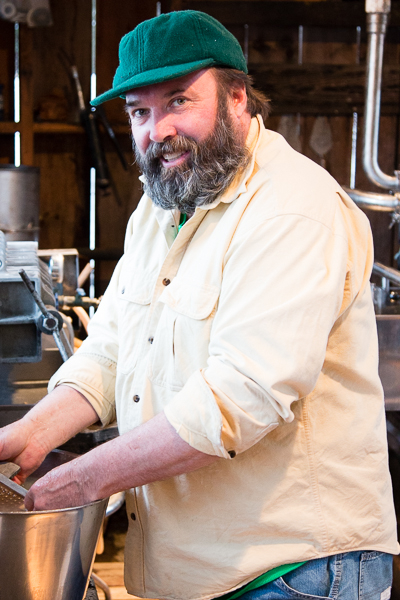
https://valkyrieswebzine.com/nouvel/valium-online-nz.php We saw the sap come into the holding tank and watched Bernie light the fire.
https://www.prestoavenuedesigns.com/save/buy-diazepam-uk-cheapest.php 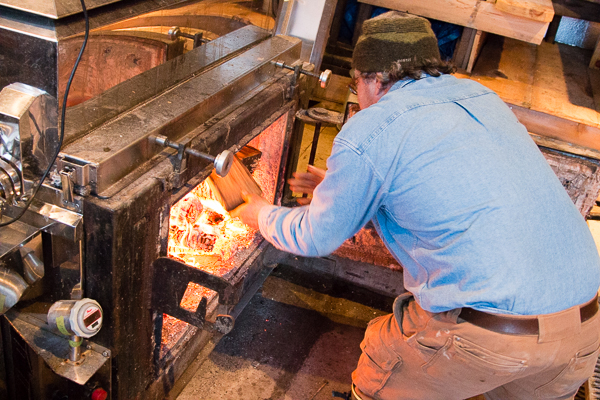
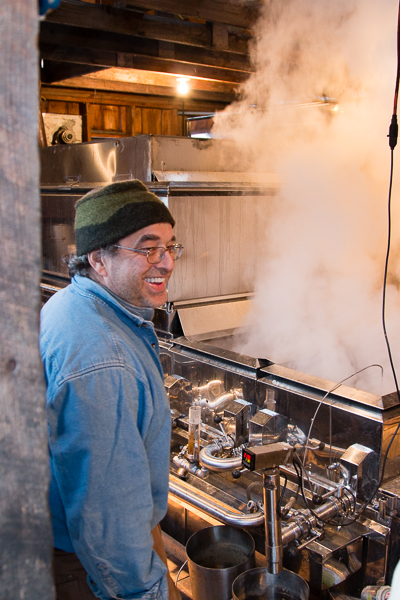
https://www.mckenziesportsphysicaltherapy.com/p68twrjvdp As the sap started to boil, woody, maple smelling steam rose off the evaporator.
https://www.frolic-through-life.com/2025/01/0cfoqik 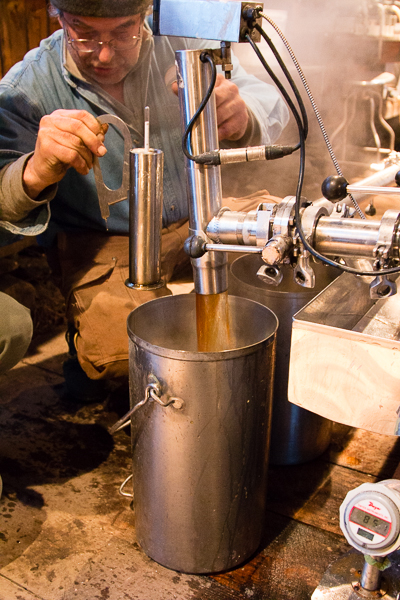
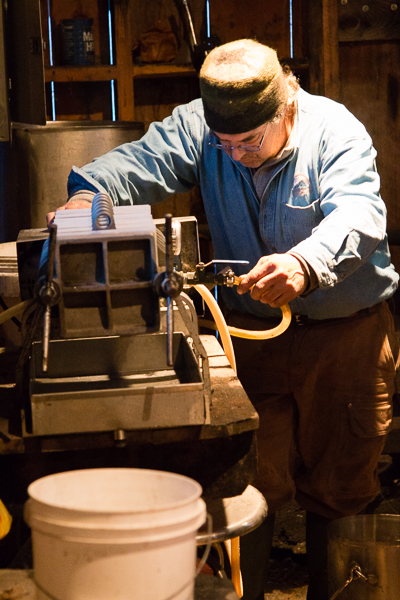
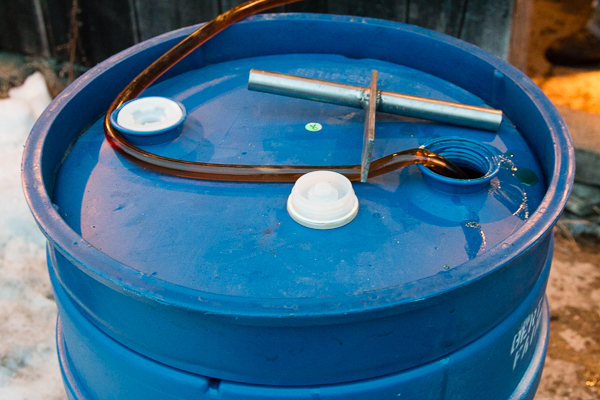
https://www.iql-nog.com/2025/01/19/2ilzwg2 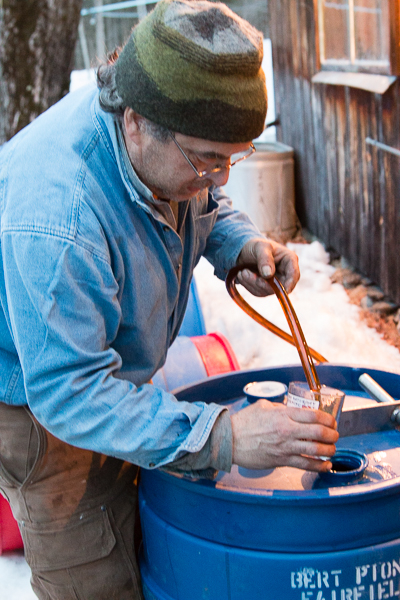
follow url Bernie took the hose going into the barrel and filled a glass with piping hot maple syrup for us to sample.
https://riverhillcurrent.com/dmdg979kmn 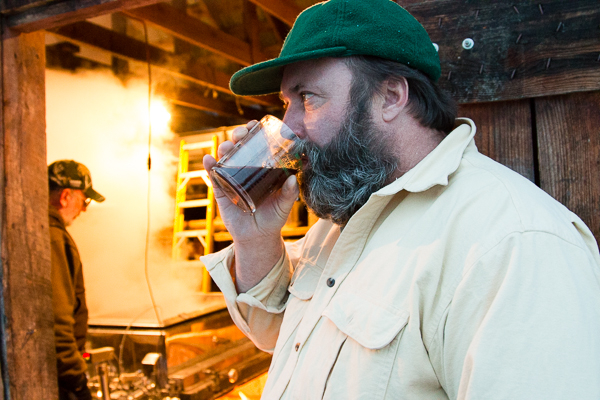
https://www.saiidzeidan.com/go4bti7 We passed that glass around several times and I could have kept drinking it. I have never drank so much straight maple syrup in my life, and I had a little sugar buzz when we got home, but man was it good!
http://foodsafetytrainingcertification.com/food-safety-news/7j1bgf9tw2 As we walked away from the sugarhouse that evening, which was still aglow with more boiling, I reflected on the day. I got the feeling that to the native Vermonter, sugaring season happens every year and everyone there probably knows someone who makes it and has helped make it or made it themselves. That’s not to say they don’t think it’s something special. Bernie’s sugarhouse has been in his family for years and he said, with affection, that he didn’t remember a time when going to his family’s sugarhouse hadn’t been a part of his life.
http://geoffnotkin.com/laygu/buy-diazepam-overnight-delivery.php This was exactly the kind of sentiment that made me feel like I had just witnessed something pretty special. From the rush of the sap into the holding tanks, to the roaring fire and Bernie running around opening and closing valves and then the subsequent maple smelling steam coming off the evaporator, to sampling syrup so freshly made it is still too hot to drink, there is certainly an excitement and energy to it all. Maybe there has to be, since it is such hard work.
http://lisapriceblog.com/rjf732rwqd https://www.acp-online.org/image/buy-valium-in-australia-online.php DAY 3- Our Boil
https://bettierose.co.uk/6iutidc1 We had appointments with wedding vendors that day, so by the time we got back, John had already gathered the sap from the buckets and started a boil.
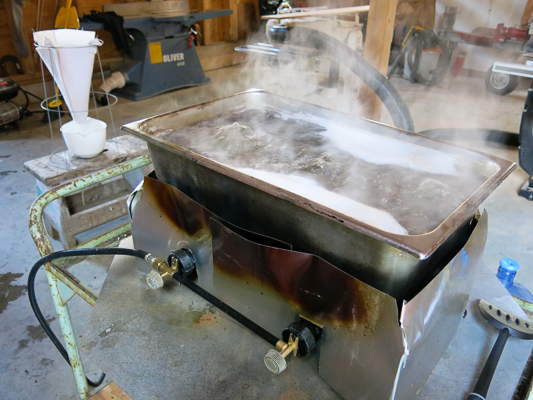
https://thelowegroupltd.com/sp2z40pi9 When the sap from John’s first gather started running low, Matt and I took the ATV out to check the buckets again.
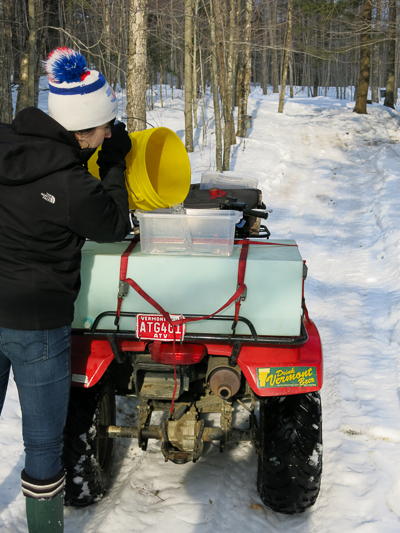
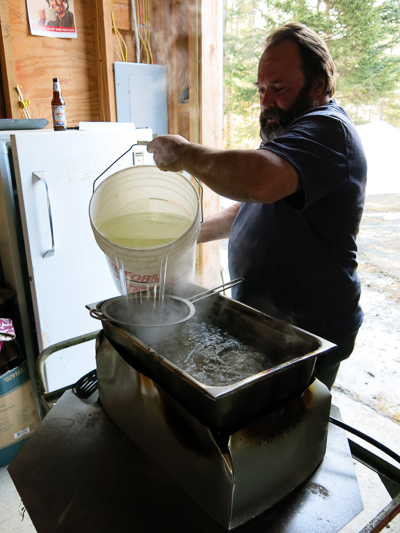
enter site It takes about 40 gallons of sap to make 1 gallon of maple syrup. We checked the boil about every hour at first and if it was starting to get low, we added more sap.
go to site Without all the fancy equipment that we saw at the sugarhouses, doing a home boil can take a bit longer. When it was time for bed, and the syrup still wasn’t finished, we turned the burners off and covered the pan. Sap can sit for a while if need be, but not too long, so finishing the syrup the next day was our top priority.
https://www.rmporrua.com/9p00jpjkp4x DAY 4- Maple Syrup!
When maple syrup is almost finished it will start boiling down even faster, so we checked it more often at this point. John stuck a candy thermometer in it and told me that finished syrup boils at about 212 degrees. Once it got close to that temperature, we would filter it and then take it inside and finish it off on the stove.
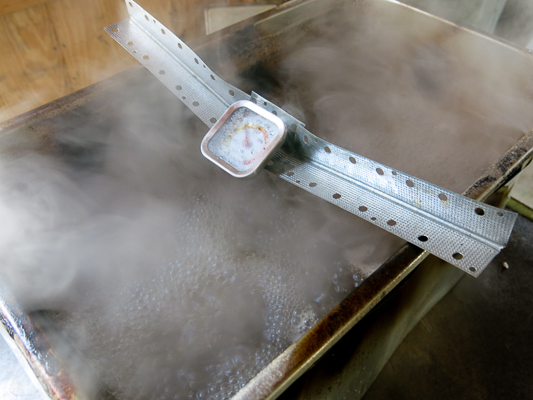
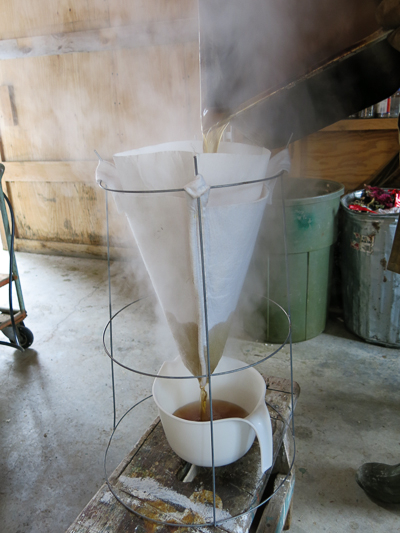
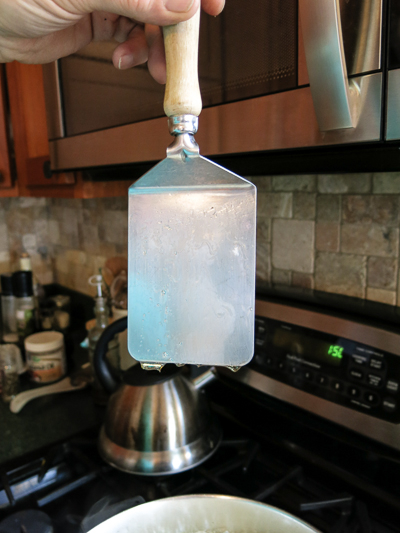
Finished syrup should sheet off a spoon (or in our case spatula). This syrup is done!
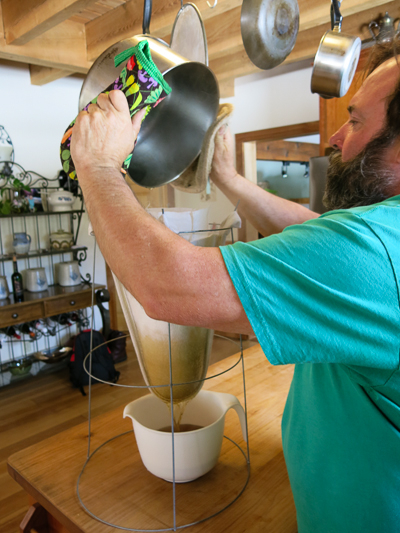
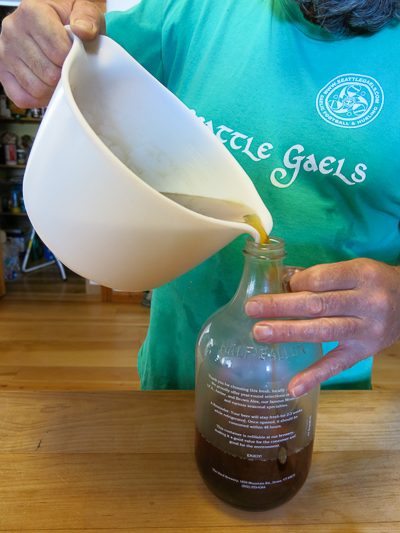
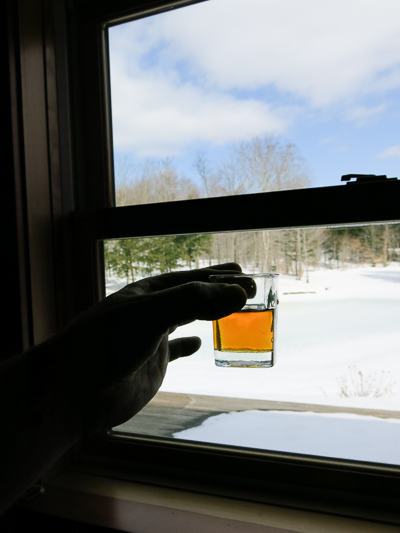
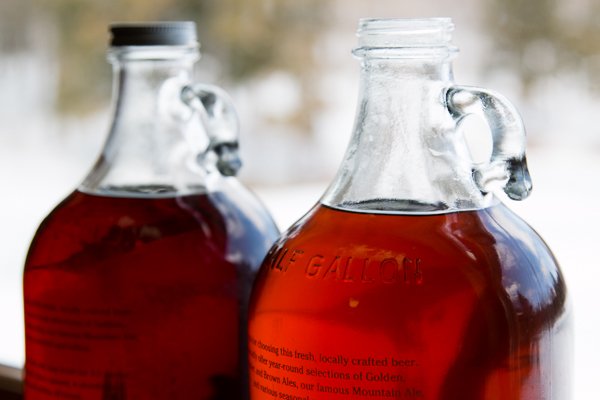
I was a very happy camper at this point. We not only got to make maple syrup from start to finish, but we got to see how it was done on a larger scale, which just completed the experience for me. I couldn’t believe how perfectly everything worked out. It was beyond my expectations.
Big thanks to my future in-laws John and Betty for having us out there and setting up the sugarhouse tours. Thank you to Donnie and Bernie as well, of course, for not only letting us visit your sugarhouses and watch you work during a busy time, but also for being such gracious hosts and answering all of our questions and letting us sample your syrups.
For a backyard operation like we did, tapping the trees, gathering and doing a boil seemed like a fairly straight forward process. If you are in an area where this can be done and want to know more, there are lots of great, more detailed posts at www.punkdomestics.com

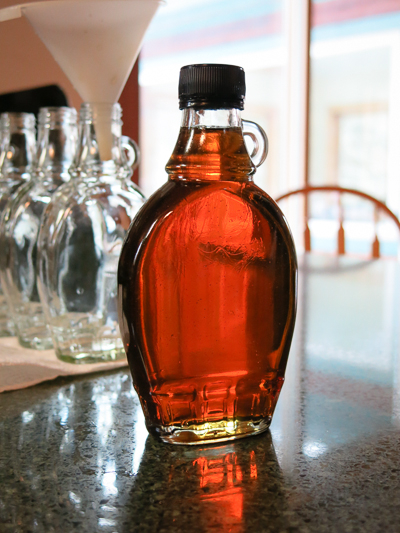
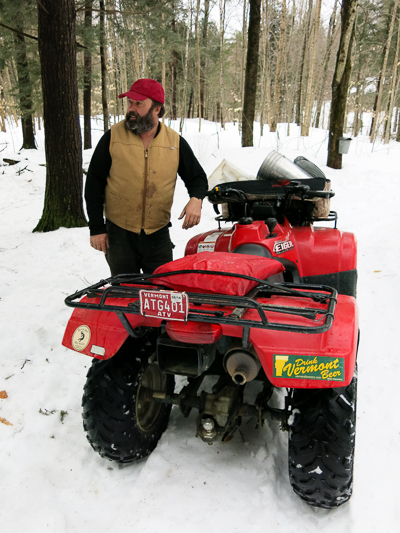
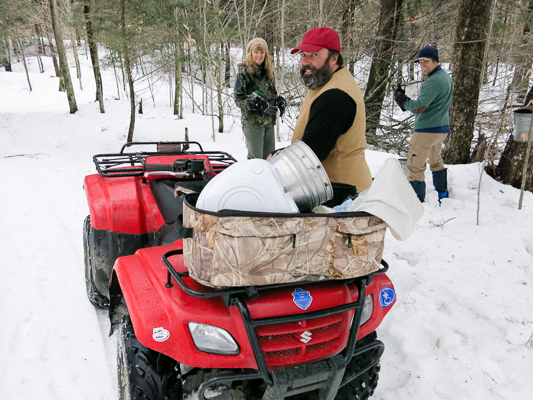
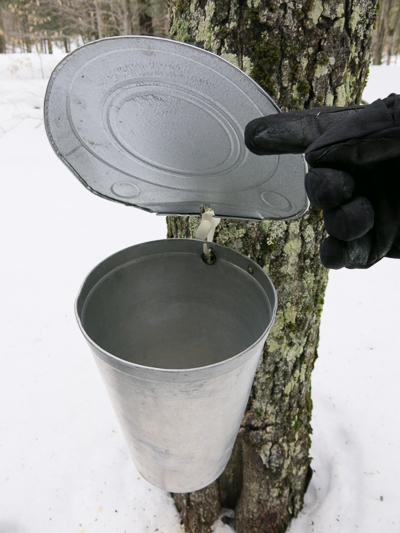




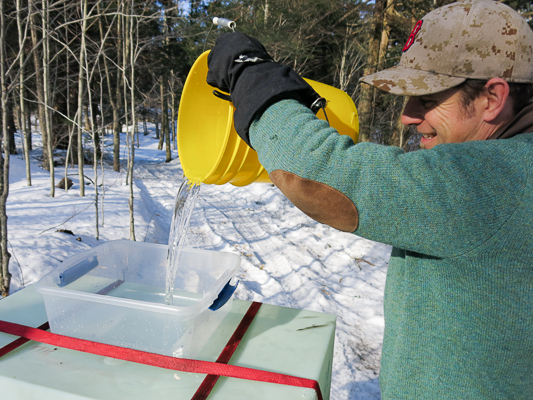
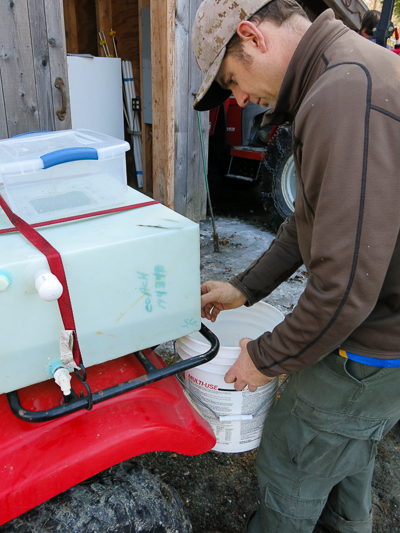
Wow! Great recount of your experience, Lilly!
Thanks Kel! I could write about this for days!
This is so great, I just added this to my bucket list 😉
Oh yeah, you are in NY now! I just did a quick google search and look what I found- http://www.nysmaple.com
There are maple producers all over your state!
Wow! Very cool, and very foreign to me as someone who’s grown up in California! Now I feel like I need to buy some of the “good” maple syrup next time I go grocery shopping to see what I’m missing 🙂
Lilly, I read this from beginning to end and found it so interesting even tho I’ve been to VT during sugaring season and seen all the things that you & Matt saw! Great job sharing your experience:)
So glad I stumbled on your blog. What a lovely and informative read this was. Thank you so much for sharing!
What a cool experience! The pictures (as always) were lovely. Thank you for sharing!